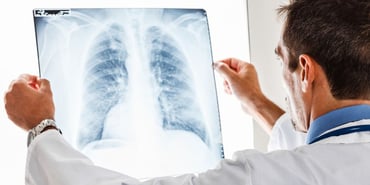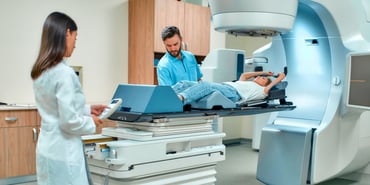
While smoking can cause lung cancer, it isn't the only risk factor. Lung cancer is also diagnosed in people who have never smoked. There are several important factors, besides tobacco use, that increase the risk of developing lung cancer. These factors can cause lung cancer even if you've never smoked or chewed tobacco in your entire life.
- Exposure to radon.
- Cancer-causing agents.
- Long exposure to air pollution.
- Secondhand smoke.
- Gene mutations.
1. Radon Exposure
This chemical is a radioactive gas that seeps from uranium deposits. It can get trapped in your home and inhaled. Over time this can cause lung cancer. To avoid exposure, you should test your home for radon or install a radon mitigation system if testing comes back high. Much of the Portland area is known for moderate to high radon levels. Find out more about how to test for radon and what to do to lower your exposure.
2. Cancer-Causing Agents
Inhaling or ingesting cancer-causing agents like asbestos and benzene can cause lung cancer. These carcinogens can build up inside your lungs over time if you're exposed to them at high levels regularly. They can even linger in your body long after exposure has ended, so be sure to do everything you can to avoid contact with these harmful substances.
3. Air Pollution
Air pollution may cause lung cancer by triggering DNA damage, leading to tumor growth. Being exposed to high levels of air pollution for long periods of time can increase the risk of developing lung cancer. It's important to take precautions to minimize exposure.
4. Secondhand Smoke
The more exposure you have to secondhand smoke, whether it's through living with someone who smokes or visiting friends and family members who smoke, the greater your risk is for developing lung cancer.
5. Gene Mutations
Changes in our genes can happen over time from exposure to different environmental factors, such as chemicals, smoke, and pollutants. These changes, known as somatic mutations, can affect genes like TP53, EGFR, and KRAS, which are linked to non-small cell lung cancer. Many people are unaware of these genetic mutations, and there are currently no recommended lung cancer screenings for non-smokers.
However, hereditary, or germline mutations, can be passed on to children by both the father and the mother. If lung cancer runs in your family, particularly if the affected relative was a non-smoker, your doctor might suggest more frequent monitoring. Sharing your family's medical history with your doctor is important, especially if you're noticing symptoms linked to lung cancer.
Some cases of lung cancer have no clear cause. Understanding what is most likely to cause lung cancer can help you make informed decisions about reducing your risk.
Lung Cancer Screening
Lung cancer screening has become more readily available in the past decade, helping to detect and diagnose lung cancer at an earlier stage when it’s easier to treat. However, it’s typically only offered to those who have a history of smoking. If you feel you’re at high risk for developing lung cancer based on exposure to one or more of the risk factors we described, talk to your doctor about whether it can be done for you as well. The screening procedure is a low-dose chest CT scan to check for any areas of concern in the lungs.
Related reading: Shedding a Light on Lung Cancer Screenings
Lowering Your Risk of Developing Lung Cancer
Whenever possible, try to lower your risk of developing lung cancer, and other types of cancer, by making healthy lifestyle choices, maintaining a healthy weight, and avoiding secondhand smoke or other cancer-causing chemicals. This doesn’t assure you won’t develop cancer, but you're much less likely.
Be sure to speak with your doctor about any family members or loved ones who have been diagnosed with lung cancer. They can help determine if any genetic risk factors are present in your family history.
Related reading: How to Reduce Your Risk of Developing Lung Cancer
Lung Cancer Symptoms Among People Who Never Smoked
If you don’t smoke you may not even consider lung cancer when you notice some symptoms. Two common symptoms of lung cancer in non-smokers are coughing and shortness of breath. These are usually caused by a condition called pulmonary fibrosis, which is where scar tissue forms on and around your lungs.
It's common for doctors to perform a CT scan, an X-ray, and lab tests when experiencing symptoms that last for more than a few weeks. These tests can determine if there is an area on the lung that should be biopsied or if there is another condition causing your symptoms.
Lung Cancer Care in Portland-Vancouver
If you are newly diagnosed with lung cancer, Compass Oncology is here to help those in the Portland, OR, and Vancouver, WA areas. We provide patients with a wide range of advanced treatment options, including lung cancer treatments based on your body’s biomarkers. Our lung cancer specialists create individualized treatment plans that work best for you. Request an appointment for an initial consultation. Second opinions are also available.
Original content published February 2024. Updated February 2025.



